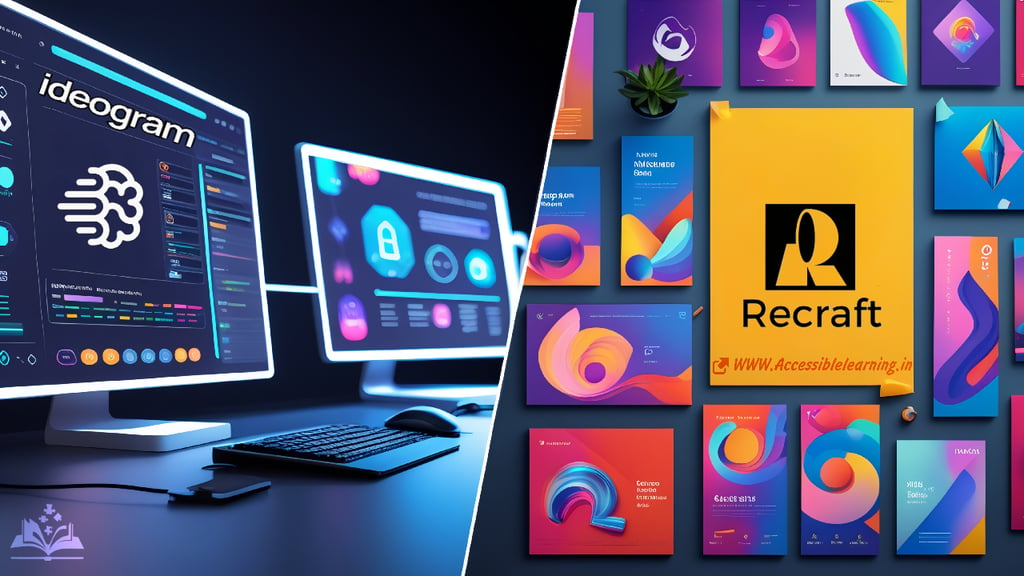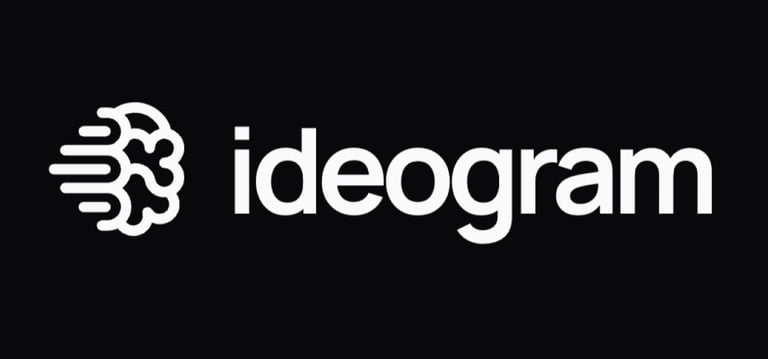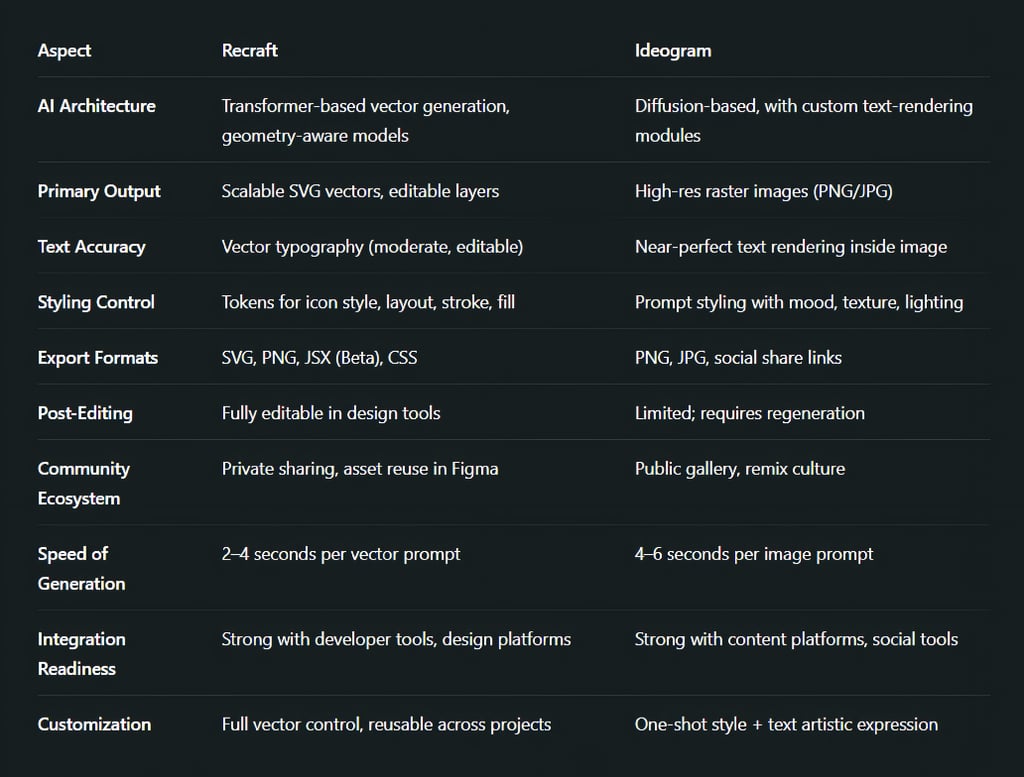
Recraft vs Ideogram: Which AI Design Tool is Right for You?
Compare Recraft vs Ideogram in 2025 with this in-depth guide exploring their AI architectures, output quality, design capabilities, and ideal use cases. Discover which tool is best for UI design, branding, or typographic image creation.
AI ASSISTANTAI/FUTUREEDUCATION/KNOWLEDGEAI ART TOOLS
Sachin K Chaurasiya
4/24/20256 min read


In the rapidly expanding world of AI-powered creativity, two platforms have caught the attention of digital creators, marketers, designers, and tech enthusiasts: Recraft and Ideogram. Both tools allow users to generate compelling visuals from text prompts, but their core strengths, underlying technology, and target user base are quite different.
If you’re deciding between these two, this in-depth guide on Recraft vs Ideogram will help you choose the right tool based on your needs, style, and workflow. Let’s break down what each tool offers, where they excel, and how they can fit into your creative process in 2025.
What is Recraft?
Your AI Design Assistant for Vector Graphics
Recraft is a modern, AI-powered graphic design tool specialized in generating clean, editable vector illustrations, logos, icons, and UI assets—all from simple text prompts. Its focus on scalable vector graphics (SVG) sets it apart from most AI art generators that produce raster images like PNG or JPG.
Created with designers in mind, Recraft combines prompt-based generation with design-level precision. It doesn’t just make images—it builds structured visuals that are useful for real-world branding, UX/UI design, web development, and marketing.
Key Features
AI-Powered Vector Generation: Generate high-quality, layered SVGs perfect for web, print, branding, and UI/UX design.
Prompt-to-Design Workflow: Type your idea and instantly generate logos, illustrations, banners, or social posts.
Layered & Editable Output: Outputs are fully editable—each element can be customized, repositioned, or restyled.
Pre-built Styles & Templates: Offers clean layouts, flat icons, modern illustrations, and more—ideal for maintaining a consistent visual identity.
Text in Vector Format: Recraft handles typography decently within vector outputs, though not with stylized finesse.
Technical Foundation
Model Type: Transformer-based multimodal architecture with reinforcement learning layers for geometric consistency.
Input: Natural language prompt + optional design constraints (color, layout, symmetry).
Output: SVG, PNG (vector first), layered structure, design tokens (CSS-ready).
AI Stack: Likely built on a diffusion-adjacent system fine-tuned for geometry and vector path prediction rather than pixels.
Training Dataset: Curated datasets of SVG/illustration libraries (e.g., Feather, Heroicons, Material), icon packs, UI kits, and open design systems like Figma community files.
Ideal Use Cases
Logo and brand identity design
UI components and web assets
Presentation visuals and icons
Social media post layouts
Digital illustrations in clean styles
Developer/Designer Integrations
Figma Plugin (Beta)
SVG API Access (Upcoming)
Adobe XD & Framer Support (Planned Q2 2025)
Strengths
Editable Vector Output (SVG): Perfect for UI/UX design, logos, icons, and scalable design components.
Design Precision: Outputs layered, grouped assets that are easy to tweak in Figma, Illustrator, or code (JSX).
Style Consistency Tools: Maintains brand consistency across outputs with control over stroke, fill, and shape.
Developer-Friendly: Supports design-to-code pipelines with CSS and React JSX export options.
Fast Rendering: Lightweight prompts return clean assets within seconds.
Weaknesses
Limited Artistic Expression: Not ideal for photorealism, surreal art, or expressive compositions.
No Built-In Typography Generation: While you can generate vector text elements, it doesn’t handle artistic fonts or letter-styling like Ideogram.
Fewer Public Templates or Style Packs: Unlike Ideogram’s remixable community gallery, content sharing is more private.
Still Maturing: Plugin support and some export tools are still in beta (Figma, Adobe).


What is Ideogram?
Text-to-Image Art with Stunning Typography
Ideogram is an AI image generator that excels in creating beautiful, stylized images that include realistic text embedded inside. Unlike most generative image models that struggle with written words, Ideogram is purpose-built to render text within images accurately—making it ideal for posters, advertisements, social media graphics, and visual storytelling.
Developed by former Google Brain researchers, Ideogram blends deep learning with artistic freedom, letting users create surreal, photorealistic, or cartoon-style visuals—all enhanced by impressive font handling.
Key Features
Exceptional Text Rendering: It nails placing words within images—perfect for signage, quotes, T-shirt designs, etc.
Creative Prompting Engine: Supports highly stylized outputs through custom prompts, including mood, medium, lighting, and perspective.
Wide Artistic Range: From anime to noir, fantasy to sci-fi—Ideogram supports a broad visual spectrum.
Community Gallery & Remixing: Allows users to share, explore, and remix AI creations in an open, collaborative ecosystem.
Web-based Simplicity: No installation needed; just sign in and start prompting.
Technical Foundation
Model Type: Diffusion-based image generator with vector-quantized text rendering.
Key Architecture: Multimodal transformer with typographic guidance embeddings + CLIP-enhanced language conditioning.
Text Handling Mechanism: Uses an advanced typographic token alignment system, separating text prompts into visual-text layers that are composited mid-latency in the diffusion process.
Output Resolution: Up to 2048px PNG or JPG.
Training Dataset: Massive paired datasets of styled images and typographic layouts (e.g., ad posters, memes, digital quotes) from the open internet and licensed libraries.
Ideal Use Cases
Typographic posters and quote designs
AI-enhanced social media content
Book covers, ads, and album art
Storyboarding and moodboarding
Artistic exploration and experimental design
Integration Capabilities
API Access (Private Beta)
Direct export to Canva/Adobe Express (Planned Q3 2025)
Social Sharing Hooks for X, Threads, and Pinterest
Strengths
Accurate Text Rendering in Images: Solves a major pain point in AI image generation—getting text right!
High-Quality Artistic Output: Excellent for posters, album art, storytelling visuals, and concept design.
Creative Freedom: Offers powerful styling options via prompt tags (grunge, vaporwave, minimalist, retro, etc.).
Community-Driven: Remix, edit, and evolve others’ creations with public galleries and templates.
Wide Format Control: Supports custom aspect ratios and high-res outputs (up to 2048px).
Weaknesses
Raster-Only Output: Produces PNG or JPG, not editable vectors—limiting use in UI/UX workflows.
Limited Post-Editing: Once generated, artwork can't be directly edited; changes need regeneration.
Overhead with Detailed Prompts: Getting exactly what you want often requires prompt experimentation.
Heavier on Resources: Larger model footprint and slightly slower generation time (compared to Recraft).


Expert Thoughts: Which One Should You Choose?
Here’s the truth—Recraft and Ideogram serve fundamentally different creative needs. Neither tool is better than the other; the better choice depends on your project:
Choose Recraft if you need editable, professional-grade design assets. It’s the ideal companion for developers, marketers, and brand designers who want scalable output.
Choose Ideogram if you want artistic, stylized visuals with strong typography for social posts, posters, or conceptual art. It’s a better fit for storytellers, content creators, and creatives looking to impress visually.
In fact, many pros use both tools together:
Use Recraft to create a brand’s logo or UI elements.
Use Ideogram to generate background art or promotional graphics with expressive text.
FAQs
What is the main difference between Recraft and Ideogram?
Recraft focuses on generating vector-based graphics like icons, UI elements, and SVG logos, ideal for web and app design. Ideogram, on the other hand, specializes in text-to-image generation with stunning visuals and accurate typography, great for posters, branding, and artistic images.
Can Recraft and Ideogram generate editable designs?
Recraft outputs fully editable vector formats (SVG, JSX), making it perfect for designers who want control. Ideogram creates raster images (JPG/PNG), which aren’t directly editable in design software but are visually powerful for finished artwork.
Which tool is better for typography in AI-generated images?
Ideogram is clearly stronger for typography. It has built-in capabilities to generate realistic, styled text within images — a feature most other AI models struggle with. Recraft, while good with basic text as part of UI elements, doesn’t specialize in text effects or artistic fonts.
Is Recraft suitable for beginners?
Yes! Recraft is intuitive, especially for designers familiar with Figma or Illustrator. It’s beginner-friendly while still offering advanced export options like React JSX or CSS for developers.
Can I use Recraft and Ideogram together in a design project?
Absolutely. Many creators use Ideogram for concept art or styled posters and then switch to Recraft for icons, UI components, or logo refinement. They complement each other well in a multi-stage creative workflow.
Do Recraft or Ideogram offer commercial usage rights?
Both platforms typically allow commercial use, but always check the specific license terms on the platform before using assets in client projects, products, or advertising. They may evolve as these tools grow.
Emerging Trends in 2025
With AI evolving rapidly, both Recraft and Ideogram are expected to introduce new features soon. Expect more collaboration tools, better AI understanding of human intent, real-time editing capabilities, and 3D or motion graphic extensions from platforms like these.
Creators no longer need to choose between imagination and functionality—AI now lets us have both.
In the age of AI, creativity has no limits—just better tools. Whether you're designing a sleek mobile app or crafting a bold poster for your next launch, Recraft and Ideogram offer different but powerful ways to bring your vision to life.
Explore both. Mix and match. Let your imagination take the lead—because with AI on your side, design just got a whole lot easier.
Subscribe To Our Newsletter
All © Copyright reserved by Accessible-Learning Hub
| Terms & Conditions
Knowledge is power. Learn with Us. 📚


